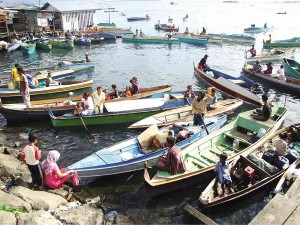Mainstreaming environmental justice
In a presentation made by Kaabag sa Sugbo coordinator Cathy Ruiz during the recently concluded Environmental Law Talks3 (ELT3) organized by the Konrad Adenauer Stiftung (KAS) Rule of Law Program Asia and the University of Cebu (UC), environmental degradation is the number one cause of poverty.
Indeed, the poorest of the poor, our fisherfolk, farmers and their families, and the indigenous peoples suffer the most through the relentless overexploitation of resources and destruction of natural systems upon which we all depend for survival.
Unlike others who have the means to pursue remedies or relief, vulnerable victims of injustice, like the callously taped innocent babies are silenced because of their ignorance of their rights or because they are chained by the fear that no one, not even the State can protect them. They have seen their own families and community members killed, maimed or listed among the desaparecidos because they dared to speak out and fought for their rights.
As former chief justice Hilario Davide Jr. emphasized in his keynote address to the ELT3 participants, when we protect the environment, we protect life itself.
When we protect the species of flora and fauna and their habitats, we protect lives and livelihoods.
A study by Duke University published last Thursday by the journal Science reported that, “Species of plants and animals are becoming extinct at least 1,000 times faster than they did before humans arrived on the scene, and the world is on the brink of a sixth great extinction.”
A call for a global ban on the trade of the Nautilus seashell was likewise echoed last week. “Peter Ward, new Professor in the University’s Sprigg Geobiology Centre, has just returned from the Philippines where he discovered the Nautilus was close to extinction at sites known for Nautilus fishing (https://phys.org/news/2014-05-iconic-nautilus-seashell.html).”
The Nautilus, called the living fossil as they have survived waves of extinction for the last 500 million years, and for which Tañon Strait Protected Seascape (TSPS) was famous as their habitat, is getting extinct. According to fisherfolk in Bindoy, a municipality which is part of TSPS, Nautilus seashells are already hard to find.
There is no debate anymore that our fisheries are in a state of crisis. Calls for reforms were reiterated last week spelled out by the Roadmap for Reforms drafted by stakeholders in the fisheries sector, which exhorted President Benigno Aquino III to face the issues besetting our seas and convene a crisis management team. It is likewise high time for the creation of a
“Department of Oceans and Fisheries” that will address all the concerns regarding fisheries, sustainable fishing and the stakeholders.
Dr. Perry Aliño noted in the same ELT3 event that we have to deal seriously with the dilemma of the increasing demand for food and decreasing fish yields.
It is most fitting that ELT3 had as its theme, “Mainstreaming Environmental Justice through Science-based, Participatory Governance and Effective Law Enforcement and Adjudication.”
It was uniquely significant because members of the bench, the prosecutorial arm of the government and our environmental law enforcers huddled, listened to and learned from the sharing of our experts from the Philippines and from Singapore, Indonesia, India and Germany and from co-participants.
The event was historic due to the presence and the inspiring speeches of the triumvirate who paved the way for the much-acclaimed Oposa ruling on intergenerational equity and responsibility chief justice Davide, as the ponente, Tony Oposa, Jr., the “provocateur par excellence” and Philippine Judicial Academy Chancellor Justice Adolf Azcuna who was the coauthor of the environmental right provision under Article II, Section 16 of the Constitution, which served as the basis for the ruling.
The speakers were Prof. Emeritus Koh Kheng Lian, Prof. Syarif Laode, Dr. Joerg Menzel, ecologist Nirmal Kulkarni, Commissioner Naderev Sano, Bureau of Fisheries and Aquatic Resources National Director Asis Perez, Undersecretary Annelli Lontoc, Dr. Perry Aliño, Dr. Rene Rollon, Dr. Lem Aragones, biodiversity expert Liza Paguntalan, Mother Earth Chairperson Sonia Mendoza, Cathy Ruiz, community-based eco-tourism advocate Boboi Costas, youth leaders Kristian Abad Lora of University of Cebu College of Law, and Zeph Repollo of 350.org and lawyers Gerthie Mayo-Anda, Ben Cabrido, Liza Osorio and this columnist.
The culminating activity was made in a sustainable oasis in the heart of a highly urbanized Cebu City –the Eco-house of our energetic and young-looking Councilor Nestor Archival, graced by the presence of Supreme Court Administrator Jose Midas Marquez. His topic, “Climate-proofing the Judiciary” reminds all stakeholders that institutions will rise and fall, depending on the degree of preparation in coping with climate change. This should pave the way for the indispensable participatory process of planning and implementing adaptation and mitigation measures nationwide in all our courts and institutions.
When do we stop destroying that which sustains us? The actions required rest upon us, with stakeholders ideally joining hands in making decisions for our future. The mainstreaming of environmental justice where public participation is a must is an urgent call of the times.
We thank KAS and its amiable director, Marc Spitzkatz for bringing the much-needed and enriching ELT3 to the shores of the Philippines, in collaboration with UC, its dedicated faculty and students, partners and the media.
Disclaimer: The comments uploaded on this site do not necessarily represent or reflect the views of management and owner of Cebudailynews. We reserve the right to exclude comments that we deem to be inconsistent with our editorial standards.

